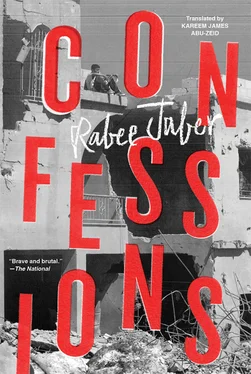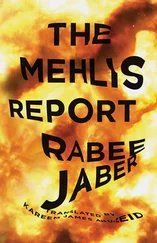I think I dozed off for a moment. I did doze off for a moment, because when I opened my eyes and looked at the sofa where Najwa had been sleeping, no one was there. A faint light was seeping in through the stained glass, the glass of the new door we’d installed between the living room and the corridor after Ilya had broken the old one. Night had fallen, and I pricked up my ears but didn’t hear a sound. A car passed by outside the house. I got up to look for my father. I couldn’t find him. I went to the room where Ilya slept. Ilya wasn’t in his bed. Where had they gone? I saw a light under the door of the room that we still called “Julia’s room,” even though she was married by then and had left the house. I pushed open the door and saw Ilya, Mary, Liliane, and Najwa on the bed. I approached silently and sat down among them. I saw some of my mother’s things on the pillow: the prayer beads; the watch with the silver dial and the leather band; and the thin gold chain with the oval pendant that contained two pictures (a picture of my father when he was a young man with long sideburns, and a picture of Maroun the deceased).
Years later, when I discovered I wasn’t myself, I remembered that moment from the Christmas holidays in 1985: opening the door and seeing, beneath the lamp, Ilya and Mary and Liliane and Najwa sitting on the bed.
My mother died, and the distance between my father and the rest of us grew. He had already been distant before. Then my mother passed, and he grew more distant still. He didn’t come to Mary’s wedding. He blessed the wedding and told the groom, “You’re my son now.” But he said he was tired and couldn’t handle a wedding. Mary was crestfallen, and for a while she didn’t come visit us, but then she did: she kissed my father on his head, then took his hand and kissed his fingers. He pulled her to him and asked her how she was.
It was Najwa who said he was putting walls up around himself. She’d go up to the roof to sit with him, and he’d run away from her, he’d escape to his birds: he gave them some seeds, changed their water, cleaned their cages, and moved the cages. He was running away. His friends — from his days at the port, and before that, too — had stopped visiting him because of his mournful silence. They’d ask him questions, and he wouldn’t answer. Then he’d get up and leave them alone with Liliane in the living room.
I only have hazy memories of the time between mother’s funeral and Mary’s wedding. During the same period, Najwa quit her job at Zahrat al-Ihsan and worked for a little while at the Three Moons School, then she quit that job as well. She was taking a lot of sedatives. One evening, while we were watching images on the news from the War of the Camps, which was raging in West Beirut, Najwa said some harsh words to Liliane (she wanted Liliane to change the channel, but Liliane didn’t change it) and got up and hit the TV. She hit it several times, and it went dark, and then she pulled the cord out of the wall and threw it on the floor. She punched the door as she stormed out of the room. Liliane and I were left sitting in front of the silent television. I opened my mouth and said something. I don’t know what I said, but I don’t think my words were the cause of what happened next: Liliane turned toward me and told me to shut up and not get involved. Have I told you how her face changed in the blink of an eye, how she turned from an angel (Liliane had my mother’s beauty) into a devil? My words didn’t cause that.
After ’85, the house began to close in on us. My mother was gone, and we all went our separate ways. The house began to feel cramped. If I saw my father’s cigarette glowing on the balcony, I’d go up to the roof, where it was cold, and the night air bit my skin, but I’d still go up to there. If the balcony was empty, I’d go out there instead, because that meant my father was up on the roof. Back then, my father and I used to change locations as if we were taking turns on guard. Ilya didn’t join us in the game. My mother’s death drove him out of the house. The Mountain War was his first departure, but not his last. Weeks after my mother’s funeral, he started squatting in a building in the Furn al-Shabbak district. He said he was renting it, but we knew his friends, and we knew that all of them were taking over apartments in Ayn al-Rumana and Sinn al-Fil and Furn al-Shabbak — the apartments of people who’d left the country.
They all left, but instead of the house getting bigger, it started feeling cramped. I remember Mary standing on the narrow kitchen balcony, waiting for her fiancé. The kitchen balcony overlooked the street, and she’d already be on the stairs before her fiancé even honked the horn of his Buick (the horn scared the birds). She’d leave in the early evening and come home after midnight. No one said anything to her, not even Julia. Times had changed — it was like my father was no longer in the house. “He’s not eating anymore,” Najwa said. My father was still eating, but he avoided sitting at the table. And it’s true he was eating less. He ate standing over the sink, or he’d take his food to the balcony or up to the roof: the birds were his excuse. He wouldn’t say anything. He punched more holes in his belt: his pants were becoming looser around his waist. He usually got dressed early in the morning and kept the same clothes on all day. He still hated pajamas, and he’d always put them on just before going to sleep — we’d only ever see him wearing pants and an unbuttoned sweater over a shirt. But all his elegance was gone. His clothes were too big for him now — it was like he was wearing someone else’s clothes.
George Sader (our brother-in-law) was the one who helped Najwa move to France. You remember the ’80s, how the dollar was doing, and how the lira crashed. Everyone’s money became worthless, people saw their savings vanish, but our brother-in-law made quite the profit: his currency exchange was flourishing, and he was on cloud nine. He helped Najwa: he contacted some relatives and people he knew in Paris, and in a few days he’d found her some work. But before that happened, before Julia got involved and asked her husband to contact some people in Paris, Najwa got into a fight with Ilya.
I didn’t know all the details. I knew Najwa was having an affair with a married man. I knew Ilya was unaware of it and then found out from one of his friends. Then he “lost his head.” That was his expression, he was the one who used it afterward, while he was explaining what he’d done to Julia and Mary: he didn’t hit her, no, but he swore at her and said some things she couldn’t bear (“they’re saying my sister’s a whore, they’re…”). He gave her a mouthful, and when she stood up to him, he pushed her (I wasn’t there, but I can imagine the scene). And he threatened her too.
“You’re not my father.”
She didn’t back down. He hit the walls and shattered the vase that had adorned the dining room table for as long as I could remember. Then he punched the door and left the house. Najwa said the only things hurt by his outburst were the canaries and his own knuckles — that’s what she said, but I could hear her saliva as she swallowed it.
A few weeks later he came and kissed her head and apologized. I don’t know what he whispered in her ear, but I saw him hug her while she tried to escape from his embrace. Then she let him apologize to her. I left the room and stayed in the kitchen till I heard Ilya calling me.
Najwa’s departure was delayed a bit because of the paperwork: it took time to get the papers ready and gather the necessary signatures, and obtaining the visa took some time as well, but all of that was taken care of faster than I’d thought possible. While Najwa was packing her bags and telling me she didn’t ever plan on coming back to “this unlucky country,” I realized I was closer to her than to the rest of my family, and I’d never realized it until she was laying her open suitcases on the living room floor and on the sofas and folding and stacking her clothes…. I remember the reddish light of the setting sun (we had temporarily removed the sandbags from the windows to let the house breathe a bit), I remember that color flowing into the living room and flooding her luggage, and I remember how the light rose until it reached the picture.
Читать дальше












